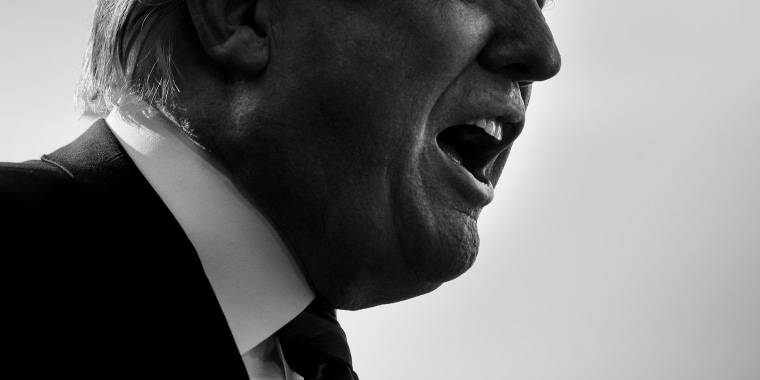Eight seconds into the video of a pro-Trump parade in Florida, a supporter of President Donald Trump in a golf cart yells out "white power!" On Sunday, Trump approvingly retweeted the video before clambering in his own golf cart for yet another 18 holes. "Thank you to the great people of The Villages," Trump commented alongside the tweet. "The Radical Left Do Nothing Democrats will Fall in the Fall. Corrupt Joe is shot. See you soon!!!"
Several hours later, after criticism from across the political spectrum, the tweet was deleted — although nothing is really deleted on the internet.
Several hours later, after criticism from across the political spectrum, the tweet was deleted — although nothing is really deleted on the internet.
On Monday morning, the president was back at it, this time retweeting a video of two armed white people in Missouri brandishing guns at protesters marching by their home. No accompanying comment from the president this time — just a retweet.
Past presidents perfected the art of the racist dog whistle — the winking nod to white Americans to let them know their racial interests will be protected. But with Twitter, Trump has developed something new: racist ventriloquism. By retweeting someone who says what he knows he can't (or shouldn't), he's able to let supporters know exactly what he thinks, without the words ever coming out of his mouth.
This ventriloquism does what all the president's favorite rhetorical tricks do: It gives him plausible deniability. After all, he didn't say "white power," and a White House spokesperson later claimed that Trump had somehow missed that one line. And Trump never said that he approved of the white couple's armed confrontation with protesters; he simply shared the video. "Retweets not endorsements," right?
Trump has also increasingly started using humor as a cover. So he was just joking when he used the racist phrase "kung flu" to describe the coronavirus. What's the matter, liberal media, can't you take a joke?
Want more articles like this? Follow THINK on Instagram to get updates on the week's most important political analysis
Such explanations are by turn convoluted, unpersuasive, and just outright untrue. But they nonetheless serve an important purpose. They're not meant to convince, but to cover, to give Trump supporters a way to say he didn't mean what he said. An entire cottage industry has sprung up on social media dedicated to the "Charlottesville hoax," an elaborate defense of the president that insists he never made his "very fine people" comments about the white power protesters who rallied in the Virginia town.
This subterfuge is not a Trump innovation. The joke excuse in particular has long been a staple of political talk radio. Rush Limbaugh, for instance, saved any real discussion of President Barack Obama's race for satirical bits, like the parody song "Barack the Magic Negro," which he argued was a send-up of liberals, not a racist number itself. (Members of the alt-right also have relied heavily on the "just kidding" defense, layering their racism with in-jokes and memes. "The unindoctrinated should not be able to tell if we are joking or not," advised the style guide for the white supremacist site The Daily Stormer.)
Limbaugh also had his own ventriloquist act, using staffer James Golden (who goes by the pseudonym Bo Snerdley) as his official Obama critic, "certified black enough to criticize." Golden would then criticize Obama in a speech thick with dialect and slang.
Yet, while Trump did not invent this sort of racist wordplay, he has made it a fundamental part of both his presidency and his re-election campaign. And little wonder: In 2016, 90 percent of Trump voters were white. This in itself is not a trend exclusive to Trump; the Republican Party has been evolving into a mostly-white party over the last generation. But based on Trump's race-baiting campaign in 2016 — from his attacks on Mexican migrants to his promise of a Muslim ban — he believes that he needs to stoke white racism again in order to win re-election.
The problem is, even Trump knows there are some lines he can't cross. His staff knows this too, which is why the white power retweet sent aides scrambling to try and reach the president, who was apparently unreachable for hours on the putting green. Although Trump's most rabid fan base is deeply loyal, there is a level of overt and vulgar racism that will drive away some white voters. Not because they refuse to vote for a racist president — Trump voters know he engages in racism; his history of racist activities, from housing discrimination to anti-Black hiring policies to birtherism, is too well-documented — but because they need to be able to muddy the waters, for others or perhaps even for themselves, when he is accused of racism.
That, by the way, also explains Trump's repeated claims to have done more for Black Americans "than any president in history." These statements are not aimed at Black voters, among whom Trump has vanishingly little support. They are meant to soothe his white supporters, to give them a talking point when others raise the issue of his racist policies and rhetoric.
So make no mistake: We'll see much more racist ventriloquism as the 2020 election nears, especially if Trump continues to trail in the polls. The Trump political playbook is thin, and his range of talents limited. Which means there is no new-and-better Trump coming, just a more-and-louder one.
Related:


